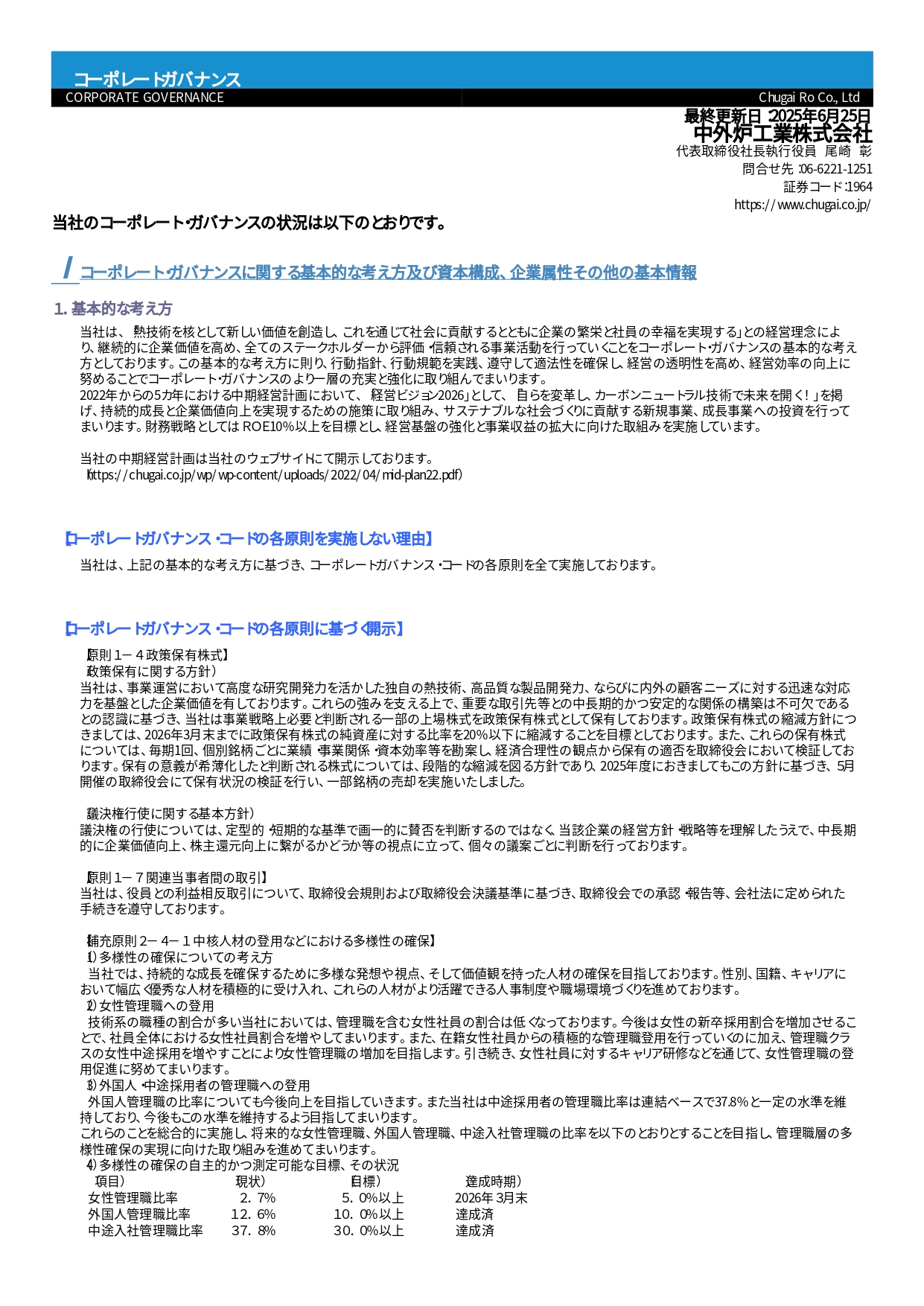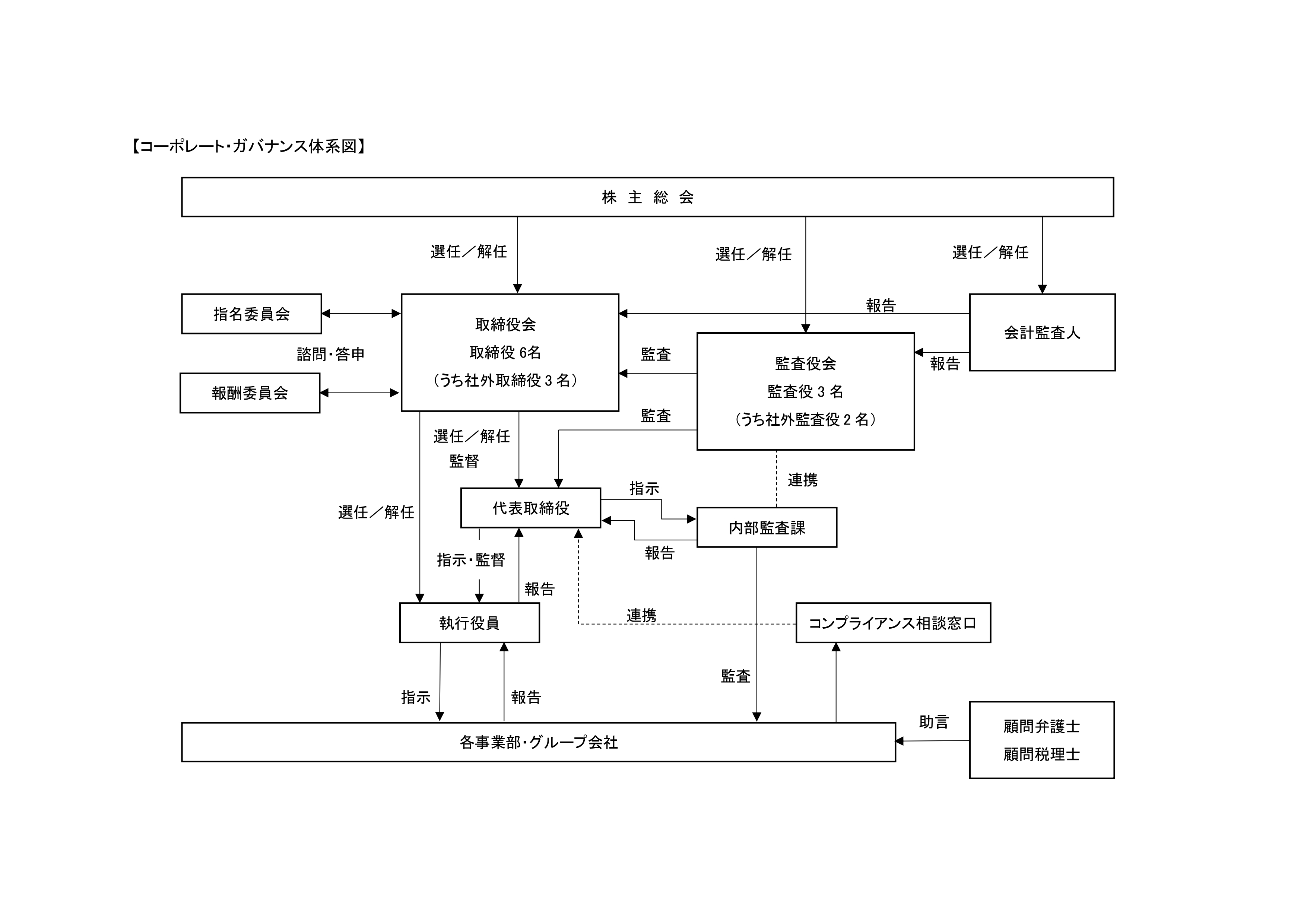Governance Governance

Corporate Governance Policy and Basic Policies
Our basic approach to corporate governance is to continuously enhance corporate value and conduct business activities that are valued and trusted by all stakeholders based on our management philosophy of "creating new value centered on thermal technology, contributing to society through this value, and achieving corporate prosperity and the happiness of employees. Our basic approach to corporate governance is to continuously enhance corporate value and conduct business activities that are valued and trusted by all stakeholders.
In accordance with this basic approach, we will work to further enhance and strengthen corporate governance by practicing and complying with the Code of Conduct and Code of Conduct to ensure legality, increase management transparency, and improve management efficiency.
In our medium-term management plan for the five years from 2022, we have set forth "Management Vision 2026": "Transform ourselves and open the future with carbon-neutral technology! We will work on measures to achieve sustainable growth and increase corporate value, and invest in new and growing businesses that will contribute to the creation of a sustainable society.
Our financial strategy is to target ROE of 10% or more, and we are implementing initiatives to strengthen our management base and expand business earnings.

Corporate Governance Report
Corporate Governance Report (PDF: 277KB)

Reasons for choosing the current corporate governance structure
In addition to emphasizing the decision-making function of the Board of Directors, which is composed mainly of directors who are well versed in practical business affairs, the Company has appointed at least one-half of the Board of Directors as outside directors to strengthen the supervisory function of the Board of Directors with respect to business execution. Furthermore, the Nomination and Compensation Committee, in which outside directors constitute the majority of members, has been established as an advisory body to the Board of Directors to enhance the transparency and objectivity of decisions on the nomination and compensation of directors.
This system has been adopted because the management monitoring system has been established by having corporate auditors and the Board of Corporate Auditors conduct audits from a standpoint independent of the Board of Directors.
Roles and Responsibilities of the Board of Directors
The Board of Directors is responsible for making decisions on basic management policies, matters required by law, and other important management matters, as well as for supervising the execution of business by directors and executive officers.
In addition, through the adoption of an executive officer system, we have delegated the necessary authority to speed up decision-making and clarify responsibilities, while directors concurrently serve as executive officers, depending on the situation, to ensure coordination between management and the field.
The Board of Directors consists of three outside directors and three internal directors, including one outside director who is a woman. The ratio of outside directors to the Board of Directors is at least one-half, thereby strengthening the supervisory function of management.
The Company held 13 meetings of the Board of Directors during the fiscal year under review, and the attendance of individual directors is as follows.
| identity | Number of times held | Number of times attended |
|---|---|---|
| Akira Ozaki | 13 | 13 |
| Shigeki Negoro | 10 (Note 2) | 8 |
| Masanori Niiya | 13 | 13 |
| Mamoru Sakata | 13 | 13 |
| Mitsuru Nagahama | 13 | 13 |
| Masaaki Nomura | 13 | 12 |
| Ryo Sato | 13 | 13 |
| Yoko Tsujimoto | 13 | 13 |
Note 1: The number of Board of Directors meetings attended above includes participation in web conferences.
Note 2: As Mr. Shigeki Negoro passed away on December 31, 2024 and retired from the Board of Directors, the attendance at the Board of Directors meetings held until his retirement is shown.
Analysis and evaluation of the effectiveness of the Board of Directors as a whole
The Company shall provide all directors and corporate auditors with the following
"Composition and Operation of the Board of Directors."
"Exercising the Functions of the Board of Directors."
"Support System for Outside Directors and Outside Corporate Auditors"
"Expectations of the Role of the Auditor."
"Effectiveness in dealing with shareholders and stakeholders."
As a result of the analysis and evaluation, we confirmed that the effectiveness of the Company's Board of Directors as a whole has been ensured.
On the other hand,
"Composition and Operation of the Board of Directors."
"Exercising the Functions of the Board of Directors."
"Support System for Outside Directors and Outside Corporate Auditors"
"Effectiveness in dealing with shareholders and stakeholders."
The evaluation of some of the items regarding the "Other" category is inadequate, and needs to be improved.
Based on the results of this evaluation, we will continue our efforts to improve the effectiveness of the Board of Directors.
Roles and Responsibilities of the Board of Corporate Auditors
The Board of Auditors currently consists of three auditors, more than half of whom are outside auditors, and one auditor with financial and accounting expertise.
In principle, the Board of Corporate Auditors meets once a month to receive reports from each Corporate Auditor on important matters related to the auditing of the execution of duties by the Directors, hold discussions, and make resolutions. Corporate auditors and the Board of Corporate Auditors actively and proactively exercise their authority to express their opinions at meetings of the Board of Directors and fulfill their roles and responsibilities related to operational and accounting audits. Corporate auditors exchange opinions with directors, the president and other executive officers as appropriate, participate in important internal meetings related to management, objectively evaluate the status and results of business execution with respect to important management issues based on the knowledge gained through the execution of auditing duties and their own work experience, and provide advice to directors and the Board of Directors as necessary. He also provides advice to directors and the Board of Directors as necessary.
In principle, outside auditors attend all monthly meetings of the Board of Auditors, where they receive reports on audit results from other auditors and share information.
Roles and Responsibilities of the Nominating and Compensation Committee
The Nomination and Compensation Committee consists of two outside directors, two inside directors and one outside corporate auditor, with the majority of the members being outside directors and outside corporate auditors. The majority of the committee members are outside directors and outside corporate auditors. The chairperson of the committee is an outside director, who is selected by a resolution of the Board of Directors.
The amount of remuneration for each individual director shall be determined based on the basic policy that the remuneration system shall fully function as an incentive to continuously increase corporate value, and that the level of remuneration for each director shall be appropriate based on his/her position, duties, performance, social conditions, etc. The drafts shall be prepared and decided by the Board of Directors after deliberation and report by the Committee in order to enhance the independence and transparency of decisions made by the Board of Directors. In order to enhance the independence and transparency of decisions made by the Board of Directors, the Committee deliberates and reports to the Board of Directors before making a decision.
The Company held 10 meetings of the Nominating and Compensation Committee during the fiscal year under review, and the individual attendance at each meeting is as follows
| identity | Number of times held | Number of times attended |
|---|---|---|
| Akira Ozaki | 10 | 10 |
| Shigeki Negoro | 7 (Note 2) | 5 |
| Mamoru Sakata | 1 (Note 3) | 1 |
| Masaaki Nomura | 10 | 9 |
| Ryo Sato | 10 | 10 |
| Masanori Hirata | 10 | 10 |
Note 1: The above number of attendance at Nomination and Compensation Committee meetings includes participation in web meetings.
Note 2: As Mr. Shigeki Negoro passed away on December 31, 2024 and retired from the Nominating and Compensation Committee, the attendance at the Nominating and Compensation Committee meetings held until his retirement is shown.
Note 3: Mamoru Sakata was appointed as a member of the Nominating and Compensation Committee at the Board of Directors meeting held on February 28, 2025; therefore, attendance at the Nominating and Compensation Committee meetings held after his appointment is shown.
About Internal Audit
The Internal Audit Section of the Company, which is under the direct control of the President and consists of two full-time organizationally independent staff members, conducts audits of the business execution status of each division and group company, makes evaluations and recommendations, and reports to the auditors, thereby maintaining and strengthening internal controls and the auditors' functions.
The Company's corporate auditors (including outside corporate auditors) receive regular detailed reports from the Internal Audit Division, the Company's internal audit department, regarding audit plans and the implementation of audits, and mutually exchange opinions and work closely with each other.
The Internal Audit Section receives reports on the status of operation of the internal control system from the management responsible for overseeing the development and operation of the internal control system in each business division on a regular basis, as well as whenever there are changes in the system or problems occur in each business division. The results are reported to the Chief Internal Control Officer, the Board of Corporate Auditors, and the person ultimately responsible for internal control, and efforts are made to evaluate and improve the system.
Compliance Promotion System
The "Chugai Ro Group Code of Conduct" has been distributed to all officers and employees of the Chugai Ro Group to ensure thorough compliance and corporate ethics.
In addition, a "Compliance Consultation Desk" has been established outside the Company to ensure a reporting line from employees.
Risk Management
The Risk Management Committee and the Business Progress Review Meeting select risks for the Company and work to prevent their occurrence. The details and results of these efforts are reported to the Board of Directors as appropriate. Through this system, we strive to create an organization that enables us to avoid the occurrence of risks, including major events, and to minimize damage when risks do occur, under a risk management system that oversees the entire group.
In addition, we recognize that climate change risk is expected to spread further in the medium to long term, and we are working to reflect this risk in our management plans and examine management methods.
We will promote a business continuity plan (BCP) to minimize the impact on our customers and reduce risks in anticipation of a major Nankai Trough earthquake and tsunami, wind and flood damage caused by typhoons and torrential rains, and large-scale infectious diseases that could pose the greatest risk to business continuity.
For companies that need help with environmental considerations and site improvements
CHUGAI RO CO., LTD. is a group of engineers with a wide variety of know-how and experience.
We are promoting a shift to decarbonization-ready industrial furnaces and burners on a global scale to achieve carbon neutrality.
Please consult with us for IT implementation and energy conservation promotion for on-site issue resolution as well as social issue resolution.




